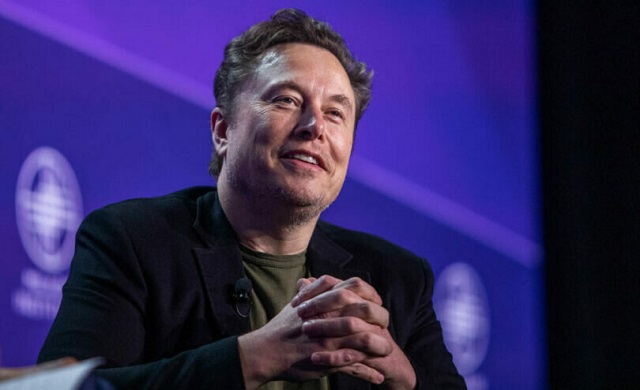Business
Elon Musk’s X sues woke speech-censoring group out of existence

From LifeSiteNews
The woke, pro-LGBT Global Alliance for Responsible Media is shutting down after Elon Musk’s X sued it over a ‘systematic illegal boycott’ against the social media company.
Elon Musk-owned X has driven the speech-censoring arm of a major advertising group to shut down after suing the organization for allegedly leading a “massive advertiser boycott” against X that violated antitrust laws.
“I was shocked by the evidence uncovered by the U.S. House Judiciary Committee that a group of companies organized a systematic illegal boycott against X,” said X CEO Linda Yaccarino in a video statement on August 6, the day the lawsuit was filed.
“It is just wrong. And that is why we are taking action,” Yaccarino continued, announcing that the company had just filed “an antitrust lawsuit against the Global Alliance for Responsible Media (GARM), four of its key members, and the World Federation of Advertisers (WFA).”
X (formerly Twitter) accused GARM, a “brand safety” non-profit initiative of WFA, of “collectively withhold[ing] billions of dollars in advertising from Twitter” after Musk bought the social media platform in late 2022.
GARM claims to help ensure that businesses aren’t “tainted” by ad placement alongside illegal or “harmful” content, which they define as including “hate speech,” “misinformation,” or even certain “insensitive” treatment of social issues.
Shortly following X’s lawsuit, WFA announced that it would “discontinue” GARM’s activities, citing a drain on its resources.
Daily Wire commentator Ben Shapiro had testified before the U.S. House Judiciary Committee that if a media group does not align with the “preferred political narratives” of GARM, the company will not be deemed “brand safe,” and its “business will be throttled.”
Shapiro pointed out that GARM’s “brand safety standards” do not “draw the line at what is criminal, abusive, or dangerous,” but “also include restrictions on hate speech, harassment, misinformation, [and] insensitive, irresponsible and harmful treatment of debated sensitive social issues.”
“Those criteria are highly subjective in theory, and they are purely partisan in practice,” noted Shapiro, recounting how GARM standards led to YouTube’s demonetization of Daily Wire host Matt Walsh for “misgendering,” “which to GARM is to say that men are not women.”
In a thread on X, Shapiro shared snapshots of emails showing how, according to the House Committee report, “GARM and its members discussed a strategy of blocking certain news outlets like @FoxNews, @realDailyWire, and @BreitbartNews.” In one email, a top executive associated with GARM admitted that he “hated” what he described as Breitbart’s “ideology and bulls***.
A member of GroupM, which according to Shapiro is “the world’s largest media buying agency,” admitted in another email, “Daily Wire is on our Global High Risk exclusion list, categorized as Conspiracy Theories.”
The House Committee report also shows an email from Rob Rakowitz, GARM’s leader and co-founder, in which he complains about “extreme global interpretations of the US Constitution” regarding freedom of speech and asks why they are globally applying U.S. norms for free speech.
Shapiro further highlighted the fact that GARM’s “corporate giant” members “together account for 90% of global advertising dollars.”
In her August 6 video, Yaccarino lamented that the effort to “boycott X” “puts your global town square, the one place where you can express yourself freely, at long-term risk.”
“People are hurt when the marketplace of ideas is constricted. No small group of people should be able to monopolize what gets monetized.”
Internet
US government gave $22 million to nonprofit teaching teens about sex toys: report

From LifeSiteNews
The Center for Innovative Public Health Research’s website suggests teenage girls make their ‘own decisions’ about sex and not let their parents know if they don’t want to.
For almost a decade, the U.S. government funded a group that actively works to teach kids how to use sex toys and then keep them hidden from their parents to the tune of $22 million.
According to investigative reporter Hannah Grossman at the Manhattan Institute, The Center for Innovative Public Health Research (CIPHR) has been educating minors about sex toys with public funds.
Records show that the millions given to the group since 2016, according to its website, go toward “health education programs” that “promote positive human development.”
However, the actual contents of the programs, as can be seen from comments from CIPHR CEO Michele Ybarra, seem to suggest that its idea of “human” development is skewed toward radical sex education doctrine.
In 2017, CIPHR launched Girl2Girl, which is funded by federal money to promote “sex-ed program just for teen girls who are into girls.” Its website lets users, who are girls between ages 14 and 16, sign up for “daily text messages … about things like sex with girls and boys.”
The actual content of some of the messages is very concerning. Its website notes that some of the texts talk about “lube and sex toys” as well as “the different types of sex and ways to increase pleasure.”
The website actively calls upon teenage girls to make their “own decisions” and not let their parents know if they don’t want to.
Grossman shared a video clip on X of Ybarra explaining how they educate minors about the use of “sex toys” and dealing with their parents if they are found out.
The clip, from a 2022 Brown University webinar, shows Ybarra telling researchers how to prepare “young person(s)” for her research.
She said if they are doing “focus groups,” she will ask them, “Okay, so what happens if somebody comes into the room and sees words like penis and sex toys on your screen — on your computer screen or on your phone? What if it’s your mom?’”
In 2023, CIPHR launched Transcendent Health, which is a sex-education program for minors who are gender confused. This initiative received $1.3 million of federal grant money that expired last month.
Grossman observed that the federal government “should not fund programs that send sexually explicit messages to minors and encourage them to conceal these communications from parents.”
She noted that in order to protect children and “prevent further harm,” U.S. President Donald Trump’s Department of Health and Human Services “should immediately cancel CIPHR’s active contract and deny its future grant applications.”
“By doing so, the Trump administration can send a clear message: Taxpayers will no longer foot the bill for perverted ‘research’ projects,” she noted.
The Trump administration has thus far, through the Department of Government Efficiency (DOGE), exposed billions in government waste and fraud. Many such uses of taxpayer dollars are currently under review by the administration, including pro-abortion and pro-censorship activity through USAID, “Diversity, Equity, and Inclusion and neo-Marxist class warfare propaganda” through the National Science Foundation, and billions to left-wing “green energy” nonprofits through the Environmental Protection Agency.
Business
Canadian Police Raid Sophisticated Vancouver Fentanyl Labs, But Insist Millions of Pills Not Destined for U.S.

 Sam Cooper
Sam Cooper
Mounties say labs outfitted with high-grade chemistry equipment and a trained chemist reveal transnational crime groups are advancing in technical sophistication and drug production capacity
Amid a growing trade war between Washington and Beijing, Canada—targeted alongside Mexico and China for special tariffs related to Chinese fentanyl supply chains—has dismantled a sophisticated network of fentanyl labs across British Columbia and arrested an academic lab chemist, the RCMP said Thursday.
At a press conference in Vancouver, senior investigators stood behind seized lab equipment and fentanyl supplies, telling reporters the operation had prevented millions of potentially lethal pills from reaching the streets.
“This interdiction has prevented several million potentially lethal doses of fentanyl from being produced and distributed across Canada,” said Cpl. Arash Seyed. But the presence of commercial-grade laboratory equipment at each of the sites—paired with the arrest of a suspect believed to have formal training in chemistry—signals an evolution in the capabilities of organized crime networks, with “progressively enhanced scientific and technical expertise among transnational organized crime groups involved in the production and distribution of illicit drugs,” Seyed added.
This investigation is ongoing, while the seized drugs, precursor chemicals, and other evidence continue to be processed, police said.
Recent Canadian data confirms the country has become an exporter of fentanyl, and experts identify British Columbia as the epicenter of clandestine labs supplied by Chinese precursors and linked to Mexican cartel distributors upstream.
In a statement that appears politically responsive to the evolving Trump trade threats, Assistant Commissioner David Teboul said, “There continues to be no evidence, in this case and others, that these labs are producing fentanyl for exportation into the United States.”
In late March, during coordinated raids across the suburban municipalities of Pitt Meadows, Mission, Aldergrove, Langley, and Richmond, investigators took down three clandestine fentanyl production sites.
The labs were described by the RCMP as “equipped with specialized chemical processing equipment often found in academic and professional research facilities.” Photos released by authorities show stainless steel reaction vessels, industrial filters, and what appear to be commercial-scale tablet presses and drying trays—pointing to mass production capabilities.
The takedown comes as Canada finds itself in the crosshairs of intensifying geopolitical tension.
Fentanyl remains the leading cause of drug-related deaths in Canada, with toxic supply chains increasingly linked to hybrid transnational networks involving Chinese chemical brokers and domestic Canadian producers.
RCMP said the sprawling B.C. lab probe was launched in the summer of 2023, with teams initiating an investigation into the importation of unregulated chemicals and commercial laboratory equipment that could be used for synthesizing illicit drugs including fentanyl, MDMA, and GHB.
The Bureau is a reader-supported publication.
To receive new posts and support my work, consider becoming a free or paid subscriber.
Invite your friends and earn rewards
-

 Also Interesting2 days ago
Also Interesting2 days agoMortgage Mayhem: How Rising Interest Rates Are Squeezing Alberta Homeowners
-

 2025 Federal Election2 days ago
2025 Federal Election2 days agoConservative Party urges investigation into Carney plan to spend $1 billion on heat pumps
-

 Also Interesting2 days ago
Also Interesting2 days agoExploring Wildrobin Technological Advancements in Live Dealer Games
-

 2025 Federal Election2 days ago
2025 Federal Election2 days agoCommunist China helped boost Mark Carney’s image on social media, election watchdog reports
-

 2025 Federal Election2 days ago
2025 Federal Election2 days agoFifty Shades of Mark Carney
-

 2025 Federal Election2 days ago
2025 Federal Election2 days agoCorporate Media Isn’t Reporting on Foreign Interference—It’s Covering for It
-

 Justice2 days ago
Justice2 days agoCanadian government sued for forcing women to share spaces with ‘transgender’ male prisoners
-

 Business1 day ago
Business1 day agoStocks soar after Trump suspends tariffs





